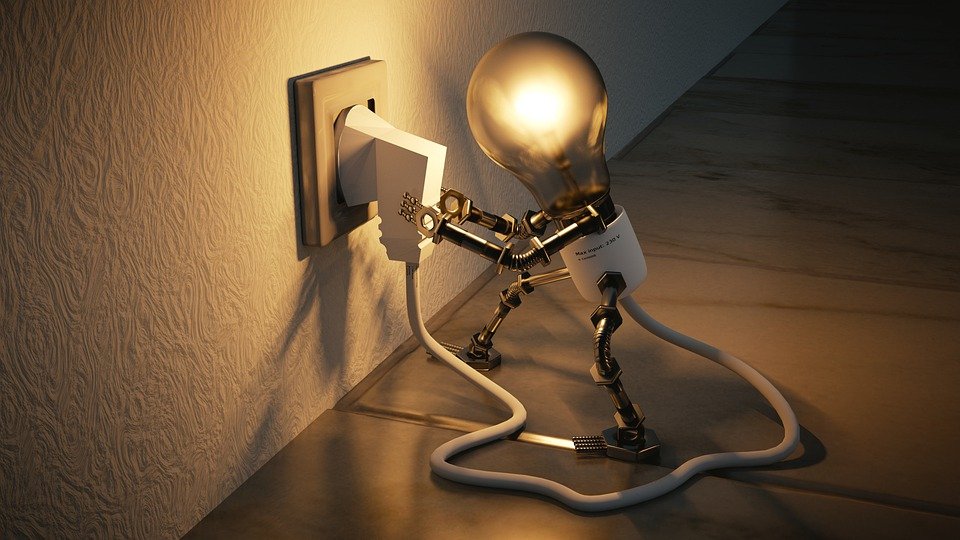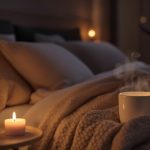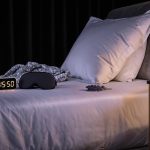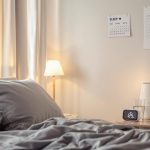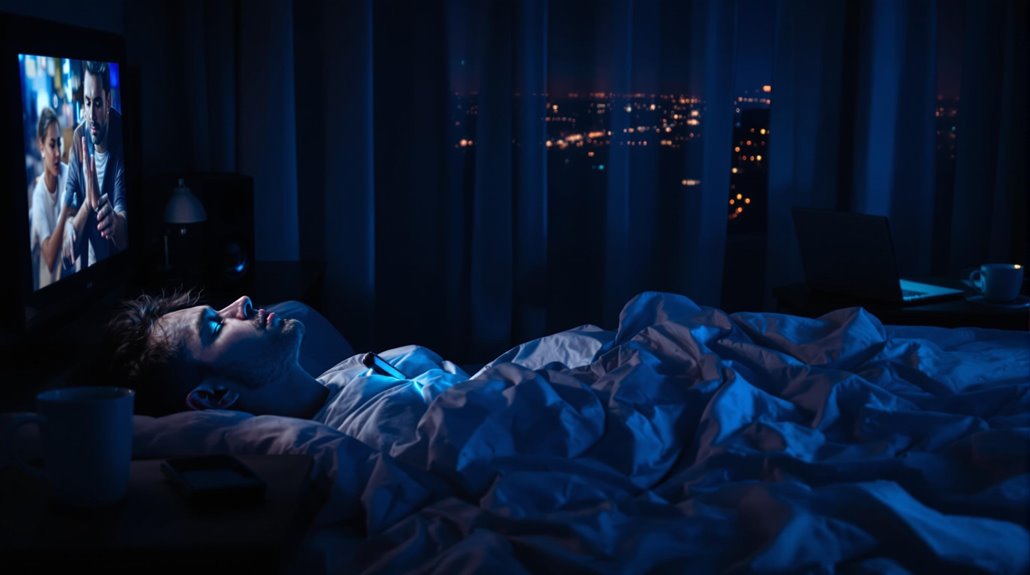
To improve your sleep hygiene, avoid vigorous activities like intense workouts before bed, as they can increase energy levels. Stick to a consistent sleep schedule to sync with your natural circadian rhythm. Create a sleep-friendly environment with cooler temperatures, dim lighting, and minimal noise. Limit caffeine and nicotine intake, especially in the hours leading up to bedtime. Handle stress through mindfulness practices and establish a calming bedtime routine. Be mindful of your evening screen time; the blue light hinders melatonin production. By addressing these common mistakes, you’ll be on your way to more restful nights and better overall health.
Avoid Stimulating Activities Before Bed
Winding down your evening involves steering clear of stimulating activities before bed. You crave freedom, and understanding how certain activities might impede your ability to drift off peacefully is key. Vigorous workouts spark up your nervous system, leaving you buzzing with energy. Instead, embrace liberation by choosing light exercises like yoga, stretching, or a gentle walk. These calming activities allow your body and mind to relax without the heart-racing effects of competitive sports such as running or high-intensity interval training. If you notice stress lingering, mindful meditation can help, as it aids in accepting thoughts and reducing anxiety before sleep. Incorporating progressive muscle relaxation into your routine can enhance your relaxation skills and promote better sleep quality. Let your evening journey remain unshackled from technology’s chains. Electronic devices emit blue light that deceives your brain into nightlife mode. Resist the allure of active screen-based entertainment and opt for savoring the simplicity of listening to soothing tunes or the soft hum of the radio. Dimming the lights further ushers in a serene sanctuary, urging melatonin to guide you towards restful domains. Lastly, protect your mental space by minimizing tasks that demand intense focus. You harness tranquility by diving into calming activities like deep breathing exercises or the gentle cadence of progressive muscle relaxation. These liberating practices help create a world where sleep isn’t just a necessity, but an exhilarating release.
Maintain Consistent Sleep Schedules
A lighthouse guides ships safely to shore, much like a consistent sleep schedule steers you towards better health and well-being. Embrace the freedom from sleep deprivation by aligning with your body’s natural circadian rhythms. Setting a consistent wake-up time and bedtime anchors these rhythms, ensuring you wake up refreshed and empowered. Walking, for instance, can be a great activity to incorporate into your schedule, as it enhances cognitive function and promotes overall well-being. Aim for 7-9 hours of sleep nightly, carving out a non-negotiable corner of time just for rest. Alarms and reminders can become your allies in this pursuit, guiding you to prioritize sleep over other activities.
Benefits bloom when you stick to a regular sleep schedule, even on weekends. Improved physical health, heightened mental clarity, and enhanced mood await you. Skipping this liberation could expose you to health risks, like diabetes and cardiovascular diseases. Consistent sleep habits can also reduce stress levels, improving mood and lowering the risk of chronic diseases.
Gradually adjust to disruptions, such as travel or work shifts, and always snap back to your regular schedule. Forget compensating with random sleep-ins; embrace the luxury of a wind-down routine instead. Offsetting lost sleep by catching extra Zs on non-work days balances your sleep debt.
With consistent practice, you’ll reveal better cognitive function, reduced anxiety, and the promise of a longer, healthier life.
Optimize Your Sleep Environment
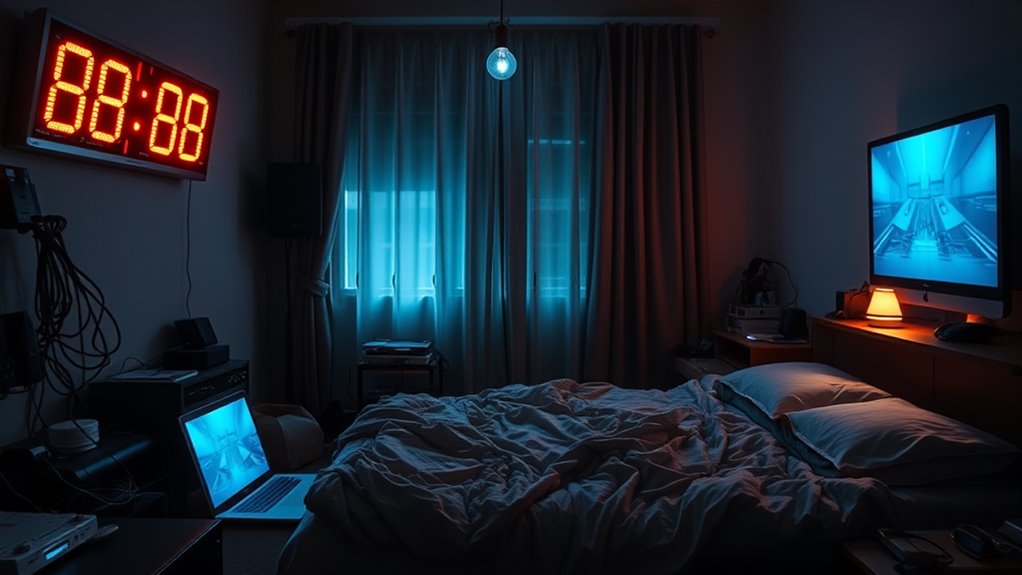
Crafting the ideal sleep environment is crucial for a restorative night’s rest. Your bedroom should be a sanctuary that frees you from daily stress. Start by controlling lighting—block unwanted light with blackout curtains or blinds, and choose dim red lights over harsh white or blue ones. Quality sleep also has a profound link to overall health and well-being, so taking these steps can have far-reaching benefits. Don’t let unwanted noise from a commercial gym interfere with sleep tranquility. Ditch screens an hour before bed to avoid disruptive blue light, and consider wearing a sleep mask for extra light blockage. Keep bedroom aesthetics simple and calming with neutral or pastel colors that won’t jolt your senses.
Temperature plays a significant role in your sleep quality. Confirm your sleep environment is cool, ideally between 60 and 68 degrees Fahrenheit. This temperature range helps regulate body temperature for maximum sleep.
Use air conditioning to maintain comfortable humidity levels between 30% and 50%. Experiment with different settings to find what suits you best.
Noise can shatter sleep tranquility, so minimize it with earplugs or a white noise machine. Position your bed away from noise sources, and consider soundproofing solutions for peace.
Practice Healthy Eating Habits
Creating an ideal sleep environment] is just the start; what you consume plays a significant role too. Embrace the power of nutrient timing and meal variety to facilitate better sleep. A balanced diet with appropriate macronutrient ratios is recommended for optimal sleep quality. Rather than letting late-night cravings dictate your eating habits, establish a rhythm. Eating at consistent, regular intervals keeps your body’s internal clock in harmony, leading to improved sleep quality.
Avoid high-fat and high-sugar foods that can disrupt this balance, causing restless nights and frequent wake-ups. Incorporating plant-based foods like greens, beans, or nuts can enhance sleep quality by providing essential nutrients that promote relaxation and regulate mood. Choosing foods that naturally promote sleep is your key to freedom. Think of options like fatty fish—rich in vitamin D and omega-3 fatty acids—or nuts and whole grains, all known to support restful slumber.
Variety in your meals means more complete nutrition; enjoy the liberation of a colorful plate full of fruits and vegetables. These nutrient-dense foods not only improve your health but also enhance your sleep quality by nourishing your body with essential elements.
Reduce Caffeine and Nicotine Intake
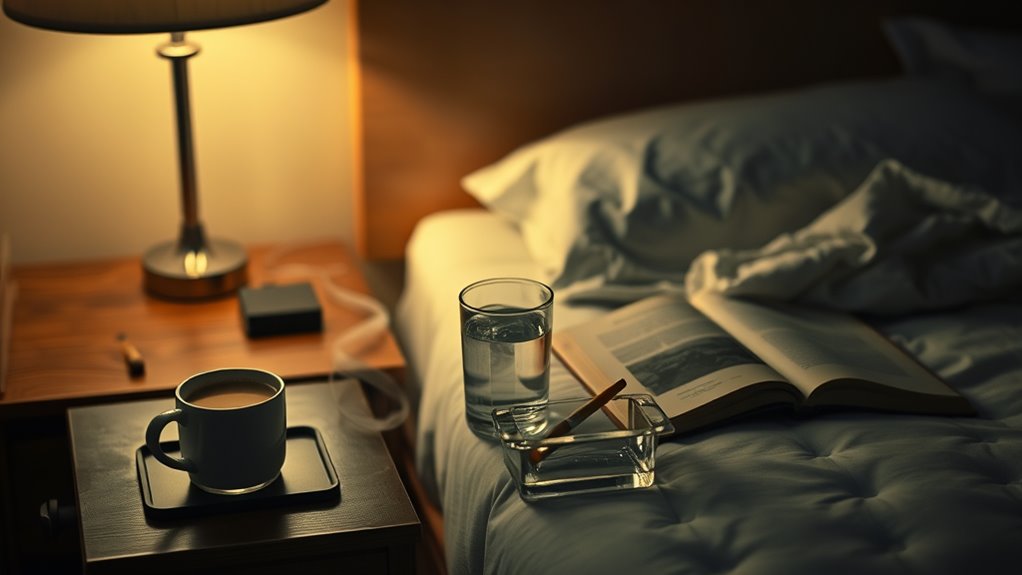
While caffeine might seem like a quick fix to combat daytime fatigue, it often comes at the cost of restorative sleep. By blocking adenosine receptors, caffeine keeps you alert but disrupts your ability to fall and stay asleep.
Consuming caffeine even 6 hours before bed can lead to increased sleep onset latency and fragmented sleep, resulting in that dreaded sleep deprivation cycle.
To help you break free from caffeine’s grip and reclaim your sleep, consider these steps:
- Limit Intake: Stick to 300-400 mg of caffeine daily, roughly 3-4 cups of coffee, to minimize sleep disruption.
- Timing Matters: Consume caffeine at least 8 hours before you plan to sleep to allow its stimulating effects to wear off and support better sleep quality.
- Mind the Symptoms: Being aware of caffeine withdrawal can motivate you to reduce consumption gradually, avoiding headaches and that pervasive sense of sleepiness.
To further support your sleep hygiene, ensure you’re adequately hydrated, as proper hydration can help avoid the energy slump that often leads people to rely on caffeine.
Caffeine isn’t just about alertness; it’s about freedom from dependency. The long-term effects can interfere with your natural sleep-wake cycle and deepen dependency.
Reducing your intake can break the vicious cycle, helping you enjoy deep, uninterrupted sleep and energize naturally.
Limit Evening Alcohol Consumption
Often underestimated, alcohol’s impact on sleep quality can be significant, leading to a range of sleep disturbances. Drinking in the evening can reduce your REM sleep, disrupting your natural sleep cycle and resulting in fragmented rest and daytime grogginess.
As you seek liberation from poor sleep, consider employing alcohol moderation to safeguard your nights. Frequent awakenings and an unsettled sleep schedule are often triggered by nighttime alcohol, affecting your body’s circadian rhythm. You can improve sleep quality by limiting alcohol intake to one or two drinks and avoiding consumption 3 to 4 hours before bed.
Embracing alcohol moderation doesn’t just benefit your night’s rest but also plays a critical role in avoiding potential health issues. Too much alcohol relaxes the throat muscles, increasing the risks of snoring and sleep apnea. These conditions lead to breathing problems, waking you up feeling far from refreshed.
By moderating your alcohol consumption, you also minimize the risk of nighttime heartburn, further securing a peaceful slumber. Remember, individual factors such as age and weight affect how your body handles alcohol.
Manage Stress and Anxiety Effectively
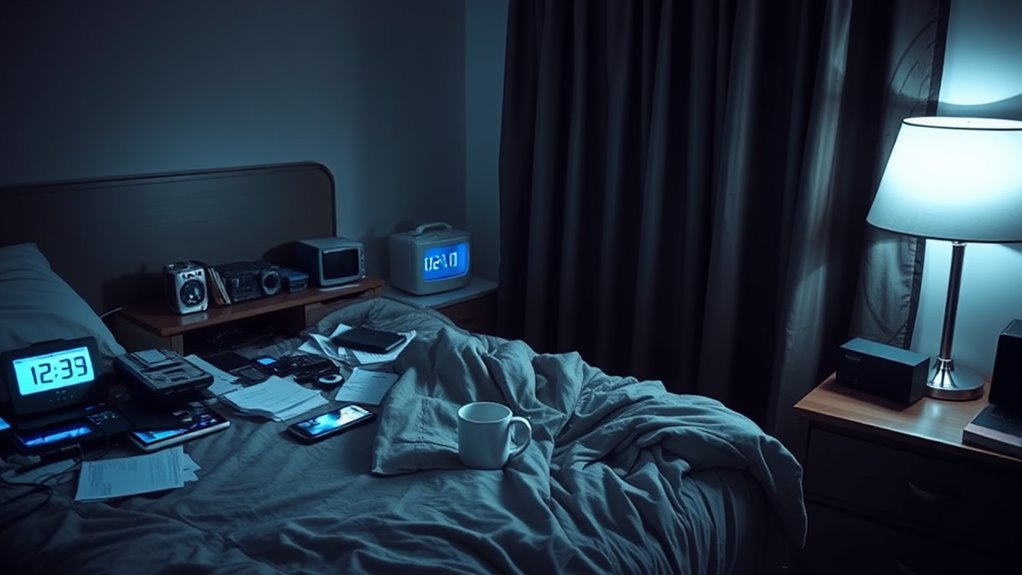
Stress and anxiety can take a considerable toll on your sleep quality, but managing them effectively can lead to a more restful night. Embracing mindfulness practices and the exercise benefits can set you free from the chains of worry and tension. Here’s how you can take control:
1. Incorporate Regular Exercise: Immerse yourself in activities like walking, running, or yoga to lift your spirits and diminish stress.
Even short bursts of movement are powerful, sharpening focus and enhancing sleep quality. The key is consistency; it’s your gateway to lasting stress relief.
2. Practice Mindfulness: Being present in the moment is liberating. Mindfulness practices, such as deep breathing or meditation, can break the stress cycle.
Techniques like the 4-7-8 breathing method promote relaxation, allowing your mind to let go of daily anxieties.
3. Adopt a Positive Mindset and Seek Support: Approach stress with a positive attitude. Assertiveness, not aggression, helps you navigate life’s hurdles effectively.
Lean on friends, family, or professionals to offload emotional burdens. You’re not alone in this journey, and seeking support can greatly lighten your load.
Embrace these strategies to reclaim your night’s peace and find liberation from stress and anxiety.
Create a Relaxing Bedtime Routine
Amid the hustle and bustle of daily life, creating a relaxing bedtime routine can turn into your nightly sanctuary. By embracing bedtime rituals, you give yourself permission to unwind and disconnect from the day’s chaos.
Start by incorporating relaxation techniques to ease your mind and body into a restful state. Deep breathing, visualization, or listening to soothing music can work wonders, washing away stress like a gentle tide.
Engage in calming activities that signal it’s time to relax and let go. A warm bath or shower about an hour before bed can help your body cool down, setting the stage for sleep. This calming ritual teaches your body to expect rest, helping you reclaim your nights.
As you build these new habits, cherish the liberation that comes with a peaceful night. Avoid stimulating activities and relish the simplicity of quietly winding down.
Swap frantic evenings for tranquil, mindful moments. A good book or a meditation session could replace the bright screens you’d otherwise be glued to, helping you savor your retreat.
Craft this oasis of calmness and rediscover what true rest feels like—unburdened, free, and entirely yours.
Use Electronics Wisely Before Sleep
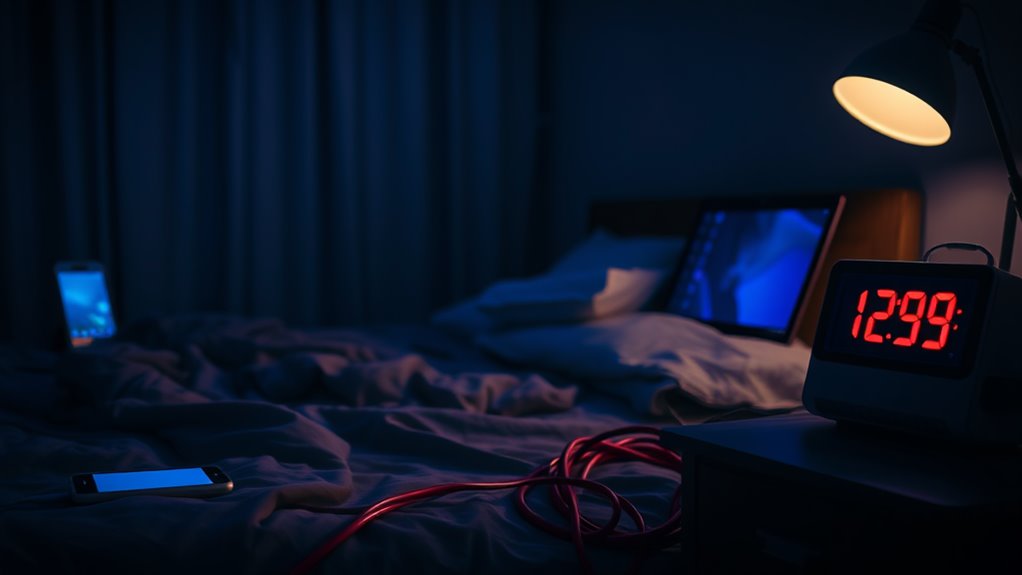
Maneuvering the world of electronics before sleep can be tricky, but understanding their impact on your rest is vital. Electronic devices emit blue light, mimicking daylight, which can deceive your internal clock and suppress melatonin. This makes drifting off to sleep more challenging. The key lies in managing your screen time effectively to guarantee a restful night.
To navigate electronics wisely, consider these strategies:
- Set a Digital Curfew: Power down electronic devices at least an hour before bedtime. This simple shift helps your body recognize it’s time to unwind and prepares you for sleep.
- Limit Screen Time: Create a “no screen” zone in your bedroom. Associating the bed with sleep rather than screen time can transform your sleep quality, putting you back in control of your nighttime routine.
- Filter Out Blue Light: Use blue light filters or night mode on devices to reduce their impact. These adjustments can maintain your circadian rhythm, making it easier to fall asleep without the interference of artificial light.
Avoid Electronic Devices Bedtime
Embracing proper sleep hygiene is essential for enhancing sleep quality and promoting overall well-being. Throughout this discussion, we’ve highlighted important mistakes that people often make unconsciously, which hamper their ability to get a restful night of sleep.
Perhaps the most common error revolves around the use of electronic devices before bedtime. The allure of screens and the habit of staying connected often override the natural signals our bodies give us to unwind and prepare for sleep.
From delaying melatonin production to disrupting circadian rhythms, the consequences of using technology at night cascade into facets of our health beyond just feeling tired. Alertness levels surge when we engage with our devices, especially due to the blue light emissions that mimic daylight, tricking our brains into thinking it’s not time for rest.
Sleep quality declines, and it can lead to struggles with cognitive function as our minds and bodies fail to recuperate fully. It’s imperative to tackle these issues by enforcing device restrictions in the bedroom. This not only involves creating a calming, tech-free environment but also includes using tools like night modes or blue light filtering glasses to mitigate adverse impacts.
To solidify these improvements, establishing a consistent bedtime routine without the interference of technology is essential. Implementing habits like reading from printed material, relying on dim red lighting, and cultivating a technology-free space all support the body’s natural inclination to rest.
These steps signal your internal clock that it’s time to wind down, encouraging better sleep and, consequently, a healthier and more alert wakefulness the next day. Sleep hygiene is more than a trend; it’s a critical practice for anyone seeking to improve life quality through the profound benefits of a good night’s sleep.


